| |||||||||||||||||||||
| Turnout | 75.59% | ||||||||||||||||||||
|---|---|---|---|---|---|---|---|---|---|---|---|---|---|---|---|---|---|---|---|---|---|
| |||||||||||||||||||||
| |||||||||||||||||||||
The City of Dunedin by-election 1897 was a by-election held in the multi-member City of Dunedin electorate during the 13th New Zealand Parliament, on 13 October 1897.
| |||||||||||||||||||||
| Turnout | 75.59% | ||||||||||||||||||||
|---|---|---|---|---|---|---|---|---|---|---|---|---|---|---|---|---|---|---|---|---|---|
| |||||||||||||||||||||
| |||||||||||||||||||||
The City of Dunedin by-election 1897 was a by-election held in the multi-member City of Dunedin electorate during the 13th New Zealand Parliament, on 13 October 1897.
The by-election was caused by the death of incumbent MP Henry Fish [1] and was won by Alexander Sligo. On nomination day (5 October) Alexander Sligo, Hugh Gourley and William Hutchison were the nominated candidates. [2] Sligo contested the election as the Conservative candidate whilst Gourley and Hutchinson both stood in Liberal interests. [3] Alexander Sligo was subsequently elected the following week. [4]
The following table gives the election results:
| Party | Candidate | Votes | % | ±% | |
|---|---|---|---|---|---|
| Conservative | Alexander Sligo | 5,045 | 45.29 | ||
| Liberal | Hugh Gourley | 4,065 | 36.49 | ||
| Independent Liberal | William Hutchison | 2,030 | 18.22 | ||
| Informal votes | 55 | ||||
| Majority | 980 | ||||
| Turnout | 11,140 | 75.59 | |||
| Registered electors | 14,811 | ||||
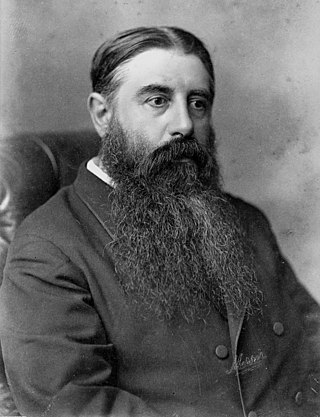
The 1875–1876 New Zealand general election was held between 20 December 1875 and 29 January 1876 to elect a total of 88 MPs in 73 electorates to the 6th session of the New Zealand Parliament. The Māori vote was held on 4 and 15 January 1876. A total of 56,471 voters were registered.

The 1890 New Zealand general election was one of New Zealand's most significant. It marked the beginning of party politics in New Zealand with the formation of the Liberal Government, which was to enact major welfare, labour and electoral reforms, including giving the vote to women.

The 1905 New Zealand general election was held on Wednesday, 6 December in the general electorates, and on Wednesday, 20 December in the Māori electorates to elect a total of 80 MPs to the 16th session of the New Zealand Parliament. A total number of 412,702 voters turned out, with 396,657 voting in the European electorates.

William Hutchison was a New Zealand politician and journalist. Hutchison and his son George were both Members of Parliament.
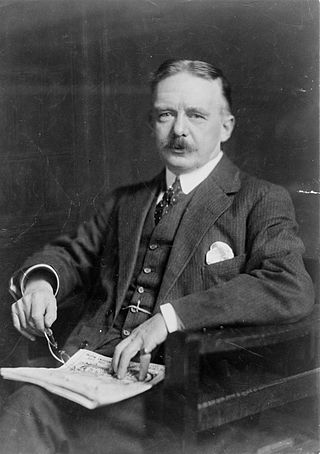
Charles Wilson was a New Zealand politician of the Liberal Party. He was the first chief librarian of the General Assembly Library.

Henry Smith Fish was a 19th-century New Zealand politician. For a time, he was a member of the Liberal Party. He was Mayor of Dunedin for a total of six years. Smith is remembered as one of the staunch opponents of women's suffrage.
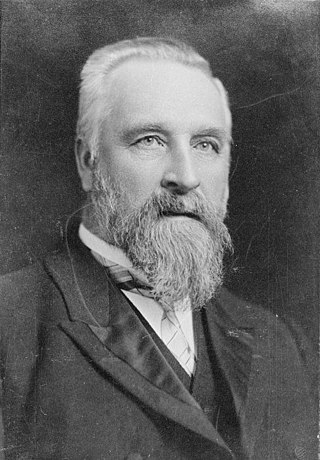
Roderick McKenzie was a New Zealand Member of Parliament for Buller and Motueka, in the South Island. He was a member of the Liberal Party.
Western Maori was one of New Zealand's four original parliamentary Māori electorates established in 1868, along with Northern Maori, Eastern Maori and Southern Maori. In 1996, with the introduction of MMP, the Maori electorates were updated, and Western Maori was replaced with the Te Tai Hauāuru and Te Puku O Te Whenua electorates.
Caversham was a parliamentary electorate in the city of Dunedin in the Otago region of New Zealand, from 1866 to 1908.
Wairau was a parliamentary electorate in the Marlborough Region of New Zealand. It was one of the initial 24 New Zealand electorates and existed from 1853 until its abolition in 1938, when it was succeeded by the Marlborough electorate. The electorate had 13 representatives during its existence. The 1861 election in the Wairau electorate was notable in that a later Premier, Frederick Weld, was unexpectedly and narrowly defeated by William Henry Eyes.
City of Dunedin, during the first two parliaments called Town of Dunedin, was a parliamentary electorate in Dunedin in Otago, New Zealand. It was one of the original electorates created in 1853 and existed, with two breaks, until 1905. The first break, from 1862 to 1866, was caused by an influx of people through the Otago Gold Rush, when many new electorates were formed in Otago. The second break occurred from 1881 to 1890. It was the only New Zealand electorate that was created as a single-member, two-member and three member electorate.
The 3rd New Zealand Parliament was a term of the Parliament of New Zealand. Elections for this term were held between 12 December 1860 and 28 March 1861 in 43 electorates to elect 53 MPs. Two electorates were added to this during this term, Gold Fields District and a new Dunedin electorate created by splitting the existing City of Dunedin into Dunedin and Suburbs North and Dunedin and Suburbs South, increasing the number of MPs to 57. During the term of this Parliament, six Ministries were in power.

The 16th New Zealand Parliament was a term of the New Zealand Parliament. It was elected at the 1905 general election in December of that year.
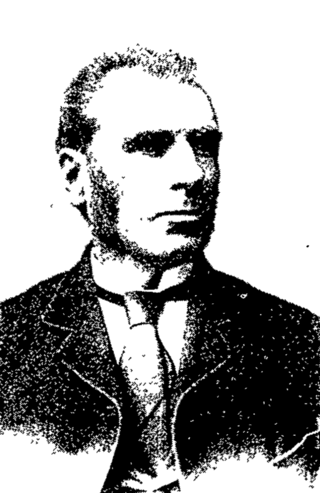
Hugh Gourley was a New Zealand politician born in Ireland. He was Mayor of Dunedin on two occasions and then appointed to the New Zealand Legislative Council for one seven-year term.
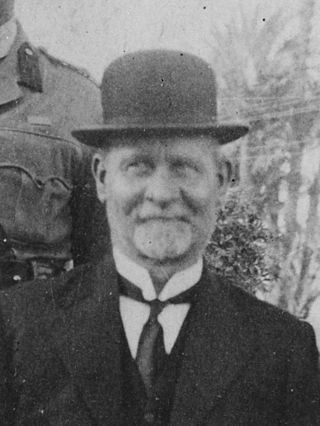
The mayor of Blenheim officiated over the borough of Blenheim, New Zealand. The office was created in 1869 when Blenheim became a borough, and ceased with the 1989 local government reforms, when Blenheim Borough was amalgamated with Picton Borough and Marlborough County Council to form Marlborough District. There were 31 mayors of Blenheim. The last mayor of Blenheim, Leo McKendry, was elected as the first mayor of Marlborough.

The Dunedin Country by-election 1858 was a by-election held in the multi-member Dunedin Country electorate during the 2nd New Zealand Parliament, on 16 June 1858. The by-election was caused by the resignation of incumbent MP John Cargill and was won by John Taylor.

Claude Horace Weston was a New Zealand lawyer, a lieutenant-colonel in World War I, and effectively the first president of the National Party (1936–1940).
The Oamaru by-election 1885 was a by-election held in the Oamaru electorate during the 9th New Zealand Parliament, on 20 May 1885. The by-election was caused by the resignation of the incumbent, Samuel Shrimski, who was appointed to the Legislative Council, and was won by Thomas William Hislop.

The 21 June 1875 Wairau by-election was a by-election held in the Wairau electorate in the Marlborough Province during the 5th New Zealand Parliament. The by-election was caused by the resignation of incumbent MP Arthur Seymour and was won by Joseph Ward, who defeated William Sefton Moorhouse. Ward was a well-known politician in Marlborough. Moorhouse had political seniority over Ward and was at the time Mayor of Wellington, but had no personal connection to Marlborough.